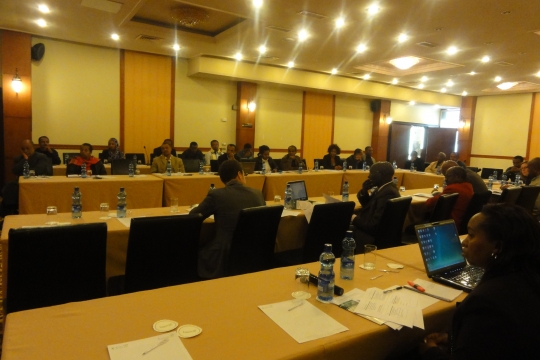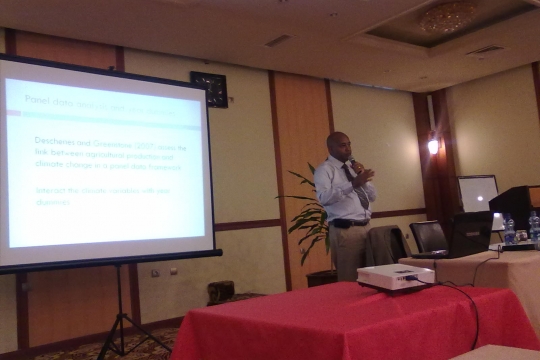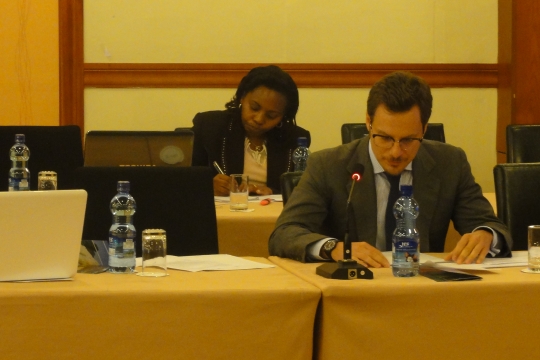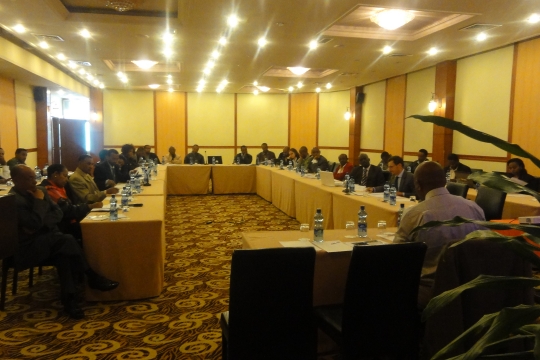A half-day workshop was organized by the Environmental Economics Policy Forum for Ethiopia on July 9, 2012 to discuss recent findings on Climate Change and Agriculture in Ethiopia. The workshop brought together over thirty researchers, academicians, project developers and implementers from over 20 governmental and non-governmental organizations.
Three papers were presented and discussed on this workshop by EfD Ethiopia Center Director, Dr. Alemu Mekonnen and London School of Economics Lecturer,and EfD Ethiopia research associate, Prof. Salvatore Di Falco. The papers were entitled ‘Impacts of Climate Change and Weather Uncertainty on Agricultural Incomes: Evidence from Ethiopia’, ‘Does Adaptation to Climate Change Provide Food Security? A Micro-Perspective from Ethiopia’, and ‘How African Agriculture Can Adapt to Climate Change? A Counterfactual Analysis from Ethiopia’.
The first paper on Impacts of Climate Change and Weather Uncertainty on Agricultural Incomes revealed that increase in long term mean temperature reduces farm revenue for high altitude crops such as teff and wheat while it leads to increase in the productivity of mid-altitude crops such as maize and pulses. Furthermore, climate-related rainfall variables have stronger and more significant impact on productivity than weather-related rainfall variables.
While this impact study uses lower level estimates as it deals only with assessing the impact of climate change on income, there are three attributes that make it different and distinctive from earlier studies. Previous studies have only assessed the impact of climate and not weather while this study assesses climate and weather. Another unique attribute is the fact that the study used a panel data (multiple observations across time) unlike other previous studies that used cross-sectional data (one time study). A third quality relates to the fact that it categorically assessed impact on different crop-types such as teff, wheat, maize, and pulses.
 The second and third papers revealed adaptation to climate change as an effective means of increasing agricultural productivity and hence food security. With this regards, information and extensions services could play major roles in creating awareness of climate change and various adaptation strategies. Furthermore, access to credit market is a driver of farm households’ decision to adopt adaptation strategies as it motivates them to make important investments that can support food productivity. The findings also highlighted the necessity of identifying and enabling vulnerable households to take up adaptation strategies as the impact is much higher for them than those that are already capable of adapting to climate change. This is explained by the unobservable characteristics these “adapter” households already possessed allowing them to produce more than the households that did not adapt even without having to use adaptation strategies. While the types of successful adaptation strategies could be area-specific and contextual, some possibilities include crop-switching, water conservation, and soil conservation. The research also indicated that applying a combination of these strategies at the same time could be more effective than applying them individually. Finding the optimal portfolio, however, is dependent on the areas where the strategies will be implemented.
The second and third papers revealed adaptation to climate change as an effective means of increasing agricultural productivity and hence food security. With this regards, information and extensions services could play major roles in creating awareness of climate change and various adaptation strategies. Furthermore, access to credit market is a driver of farm households’ decision to adopt adaptation strategies as it motivates them to make important investments that can support food productivity. The findings also highlighted the necessity of identifying and enabling vulnerable households to take up adaptation strategies as the impact is much higher for them than those that are already capable of adapting to climate change. This is explained by the unobservable characteristics these “adapter” households already possessed allowing them to produce more than the households that did not adapt even without having to use adaptation strategies. While the types of successful adaptation strategies could be area-specific and contextual, some possibilities include crop-switching, water conservation, and soil conservation. The research also indicated that applying a combination of these strategies at the same time could be more effective than applying them individually. Finding the optimal portfolio, however, is dependent on the areas where the strategies will be implemented.
Prof. Di Falco stated that to avoid misinterpretation and wrong conclusions, it is necessary to distinctively affirm the reason why these farmers are practicing these strategies in the first place. Is it from the need to adapt to a changing climate or is it simply from the need to increase productivity through sustainable land management practices? According to him, the responses obtained from the farmers and the statistical findings for this research clearly showed that the practices were adopted with the intention of adapting to climate change.
“Respondents explicitly asserted the reasons why they are practicing theses strategies are simply from the need to adapt to climate change,” stated Prof. Di Falco, “However, this is a good remark for further researches as it is indicative of the need to differentiate between adaptation strategies and traditional sustainable land management practices to distinctively claim that farmers are adopting certain strategies or techniques for solely climate change reasons.”
Dr. Alemu stated that the results presented for the research on impact of climate change and weather uncertainty were preliminary and further analysis is required to claim findings as final. "However, all the researches presented on the workshop mark a good and satisfying initiation.”
For further information please contact us on eepfe@ethionet.et



